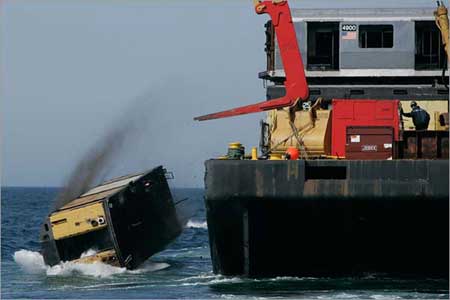It changes its hours, its temperament, and its reasons for existing faster than the seasons. Faster than some contemporary hostler can rustle up fresh horses or the unseen manager can replace fleeing steeds who take legal tender while tending behind the isthmus separating employee from customer. There are some moments during the year when it serves coffee, and other moments when it dumps these java options in favor of more alcoholic ones. (The latter scenario is the present option. It has resulted in others fleeing to more dependable joints where coffee has been a regular option for at least six months.) The place has a perfectly respectable architecture that possesses hospitable potential: plentiful tables to talk or to read, a tawny aura that isn’t likely to be profiled in Architectural Digest anytime soon, but that might work with the right clientele and the right management. Unfortunately, for those who hope to stay, there’s a revolving door in place: those who own the joint and those who run the joint are fresh-faced neophytes who emerge every two months. And you never know where the previous folks went, even when you ask around. It’s safe to say that this constant confusion about what this place is exactly doesn’t permit a hearty staple of neighborhood regulars. Without even a shred of permanence, it remains a house devoted to transients. And it inexplicably survives.
This establishment blames its current woes on the economy, which was why it recently ejected coffee from its beverage repertoire and truncated its hours. But you can find four or five boisterous talkers on any weeknight itching to turn the place seedy. And one senses a certain resistance to this not entirely unsavory option from the staff, for you can almost always hear them them bitching about crazed drunks and lonely eccentrics who they had to eject.
The folks who hang out at this place are almost never from the neighborhood. They come from SoHo, Queens, and sometimes Inglewood. A few arrive late after watching strippers at the Slipper Room, and deliver fleshy reports to anyone who will listen. A large television is behind the bar, mostly muted. Like most bars, it’s a point of reference for anyone who can’t find some topic to talk about. And there are always things to talk about. Just check your brain in at the door and concentrate on small talk.
Perhaps this place is some outre port in the storm. The place that nobody knows about or cares to acknowledge. The place where anyone who walks in and carries some sign of living somewhere within a five-block radius is viewed with a natural suspicion.
I don’t wish to name this place. There’s a perfectly wonderful bar that I could go to a few blocks down the street, but I’ve long had a soft spot for the underdogs. I am fascinated by this bar’s almost total failure as a business and as a place of natural community, but I likewise harbor some small hope that it will figure itself out. It could very well be that the anxiety now in the national air — the transition from a dopey president who seems as unstoppable as Friday the 13th‘s Jason to a guy who might actually do something — has affected its staff and customers. Or it could very well be that those in the neighborhood are “wiser” than I am, going to the sensible spots where their evenings will be predictable successes. But this seems too easy an option in a city with one of the swiftest gentrification rates in the known world.
I don’t know how long this place will last, but I hope to carry on attending. I suspect I have some modest aspirations as a flâneur. Or perhaps I’m simply waiting around or hoping to instigate some moment in which the people of New York City finally throw off the shackles.

